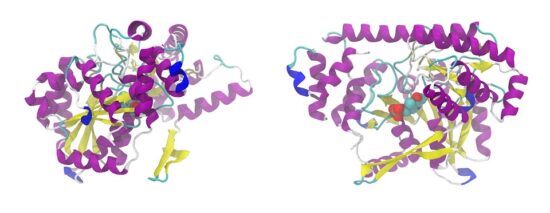Unbiased antimicrobial resistance detection from clinical bacterial isolates using proteomics
Antimicrobial resistance (AMR) poses an increasing challenge for therapy and clinical management of bacterial infections. Currently, antimicrobial resistance detection often relies on phenotypic assays, which are performed independently from species identification. Although genomics-based approaches are increasingly being proposed as possible alternatives for resistance detection, the analysis of proteins should be superior to gene or transcript sequencing when it comes to phenotype prediction from molecular data as the actual resistance against antibiotics is almost exclusively mediated by proteins. In this study, we present a unbiased proteomics workflow for detecting both, bacterial species and AMR related proteins in the absence of secondary antibiotic cultivation in less than 4 h from a primary culture. The method was validated using a sample cohort of 7 bacterial species and 11 AMR determinants represented by 13 protein isoforms which resulted in a sensitivity of 98 % (100 % with vancomycin inference) and a specificity of 100 % with respect to AMR determinants. This proof-of concept study suggests a high application potential of
untargeted proteomics in clinical microbiology.
AMR NEWS
Your Biweekly Source for Global AMR Insights!
Stay informed with the essential newsletter that brings together all the latest One Health news on antimicrobial resistance. Delivered straight to your inbox every two weeks, AMR NEWS provides a curated selection of international insights, key publications, and the latest updates in the fight against AMR.
Don’t miss out on staying ahead in the global AMR movement—subscribe now!







